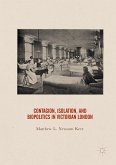Dieser Download kann aus rechtlichen Gründen nur mit Rechnungsadresse in A, B, BG, CY, CZ, D, DK, EW, E, FIN, F, GR, HR, H, IRL, I, LT, L, LR, M, NL, PL, P, R, S, SLO, SK ausgeliefert werden.
"The book is a serious contribution to the study of Cartesian physiology in the seventeenth century and beyond. ... it certainly contains essential reading for scholars of Cartesianism." (Klaas van Berkel, ISIS, Vol. 109 (1), March, 2018)
"This review cannot do justice to the incredible level of detail displayed in this book ... It provides scholars of the history of early modern medicine and science, and of cultural and social history, with an excellent insight into London in the late seventeenth and early eighteenth centuries and in doing so draws our attention to the nexus linking religious and political beliefs, on the one hand, with medical ideas, on the other." (Sietske Fransen, ISIS, Vol. 108 (4), December, 2017)
"The Germ of an Idea provides a useful account, based on exhaustive research, of a fascinating moment in British medical history. Most striking is DeLaey's demonstration of how social and political factors underwrote both the articulation of contagionist theories and the opposition to them." (John Waller, Journal of the History of Medicine and Allied Sciences, October, 2017)
"Overall DeLacy accomplishes an amazingly comprehensive and succinct survey in fewer than two hundred pages." (Ann G. Carmichael, American Historical Review, Vol. 122 (3), June, 2017)
"Margaret DeLacy has been studying the early roots of contagion theory for many years and has now produced the most important book on the topic to appear for quite some time." (Kevin Siena, Bulletin of the History of Medicine, vol. 91(2), 2017)
"The book's importance to historians of this era and medical historians especially is self-evident, because it occupies a lacuna in the scholarship. ... Although this book is written for scholarly audiences and densely packed, it is clear and accessible to general readers with avid interest in medical history. For Health Humanities professionals, this book underscores-with a twist-one of the primary lessons we hope to teach our medical students." (Sandra G. Weems, MedHum Daily Dose, medhumdailydose.com, June, 2016)









